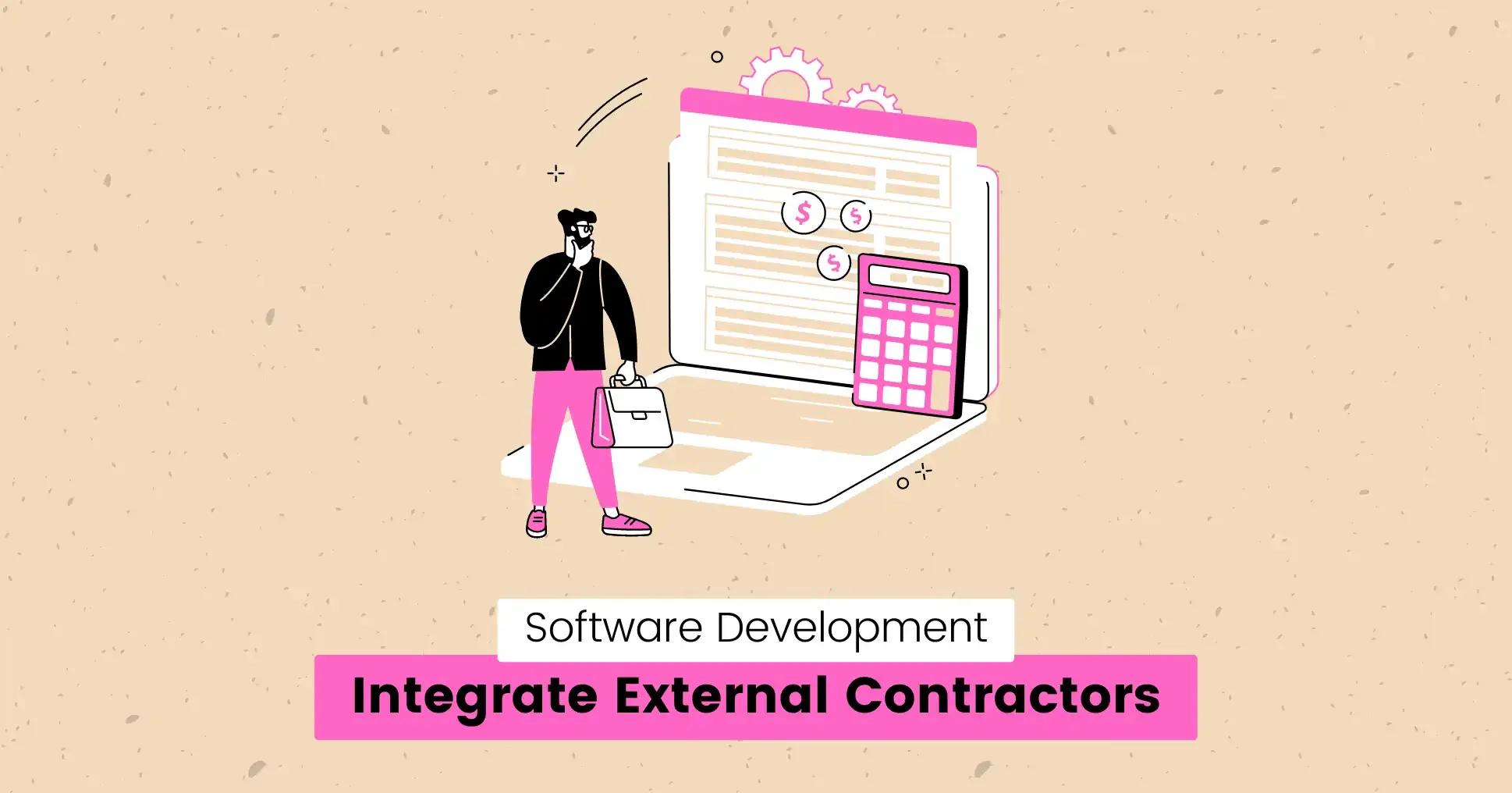How to Integrate External Contractors in Software Development (2024)

Integrating external contractors into your software development process can be useful as a business owner.
It can help you scale your projects, bring in specialized expertise , and meet tight deadlines without the overhead costs of hiring full-time employees.
But how do you make this integration smooth and effective?
This guide will walk you through the exact steps to successfully incorporate external contractors into your software development efforts.
Why You Should Consider External Contractors
Before diving into the how-to, it’s important to understand why hiring external contractors can be beneficial:
- Cost Efficiency: Save on employee benefits, office space, and long-term commitments.
- Access to Expertise: Gain specialized skills that may not be available in-house.
- Scalability: Easily scale your team up or down based on project needs.
- Flexibility: Bring in experts for short-term projects without long-term commitments.
Now, let’s get into the nitty-gritty of how to do it right.
Looking for a dedicated frontend team for your project?
Our team of experienced frontend developers is at your disposal. We offer individual solutions for your web development projects. Contact us now to learn more!

Step-by-Step Guide to Integrating External Contractors

Define Your Needs
Start by clearly defining what you need from external contractors.
Ask yourself:
- What specific skills are you lacking?
- How long do you need these skills for?
- What is the scope of the project?
Having clear answers to these questions will help you find the right contractors and set clear expectations.
Find the Right Contractors
Finding the right contractors is crucial. Here’s how you can do it:
- Freelance Platforms: Websites like Upwork, Freelancer, and Toptal are good places to find skilled contractors.
- Networking: Ask for recommendations from your professional network.
- Specialized Agencies: Consider agencies like JetCoders that specialize in building projects from start to finish.
Conduct Interviews and Assessments
Once you have a list of potential contractors, conduct interviews to evaluate their skills and fit for your project.
Focus on:
- Technical Skills: Ask specific questions related to your project.
- Cultural Fit: Ensure they align with your company’s values and work culture.
- Communication Skills: Good communication is key to successful collaboration.
Set Clear Expectations
Setting clear expectations from the start can prevent misunderstandings later on.
Discuss:
- Project Scope: Define what needs to be done.
- Deadlines: Set realistic timelines for each phase of the project.
- Payment Terms: Agree on payment rates and schedules.
- Communication Channels: Decide on tools and frequency of updates (e.g., Slack, email, weekly meetings).
Onboard Your Contractors
Proper onboarding is essential for integrating contractors smoothly into your team.
Include:
- Access to Tools: Provide access to necessary software, repositories, and documentation.
- Introduction to Team: Introduce them to key team members they’ll be working with.
- Briefing on Company Culture: Share your company’s mission, values, and work culture.
- Project Overview: Give a detailed briefing on the project, goals, and expectations.
Provide Comprehensive Documentation
Comprehensive documentation helps contractors understand your project’s difficulties quickly:
- Codebase Documentation: Make sure your codebase is well-documented so new developers can understand it easily.
- API Documentation: If they need to work with APIs, ensure that API documentation is detailed and up-to-date.
- Project Guidelines: Share any coding standards, style guides, or best practices that your team follows.
Speak to an Expert
Need advice? Our experts are here to help! Our team is ready to answer your questions and provide you with detailed guidance. Click here to schedule a free consultation today!

Use Effective Project Management Tools
Effective project management ensures that everyone stays on the same page.
Use tools like:
- JIRA or Trello: For task tracking and management.
- Slack or Microsoft Teams: For communication.
- GitHub or BitBucket: For version control and code collaboration.
- Asana or Clickup: For overall project management.
Maintain Regular Communication
Regular communication is vital for keeping contractors aligned with your project goals.
Ensure:
- Daily Stand-ups or Weekly Meetings: To discuss progress and resolve any issues.
- Feedback Loop: Provide constructive feedback regularly.
- Transparency: Keep them informed about any changes in project scope or deadlines.
Monitor Progress and Quality
Keep an eye on the progress and quality of work:
- Milestones and Deliverables: Set clear milestones and review deliverables against them.
- Code Reviews: Conduct code reviews to ensure quality and consistency.
- Performance Metrics: Track performance metrics such as code quality, bug rates, and delivery times.
Offer Training and Support
Even experienced contractors may need some training to get up to speed with your systems and processes:
- Training Sessions: Offer training sessions on your tools, methodologies, and workflows.
- Mentorship Programs: Pair new contractors with experienced team members who can provide guidance.
- Resource Libraries: Create a library of resources (videos, articles, guides) that contractors can refer to.
Request a Custom Quote
Custom solutions specifically for you. Every business is unique. Let us create a quote that is perfectly custom to your needs. Contact us now to get a quote!

Promote a Collaborative Environment
Encouraging collaboration between your internal team and external contractors can lead to better results:
- Team Building Activities: Include contractors in team-building activities to foster a sense of belonging.
- Brainstorming Sessions: Involve contractors in brainstorming sessions to leverage their expertise.
- Cross-functional Teams: Create cross-functional teams that include both internal and external members.
Address Legal and Security Concerns
Ensure that all legal and security concerns are addressed before bringing contractors on board:
- Non-disclosure Agreements (NDAs): Have contractors sign NDAs to protect your intellectual property.
- Data Security Policies: Make sure contractors follow your data security policies.
- Access Control: Limit access to sensitive information based on the contractor’s role.
Evaluate Performance
Performance evaluations help ensure that contractors are meeting expectations:
- Performance Reviews: Conduct weekly performance reviews to evaluate their work.
- Feedback Sessions: Hold feedback sessions to discuss strengths and areas for improvement.
- Incentives for Good Performance: Offer incentives for good performance, such as bonuses or extended contracts.
Plan for Knowledge Transfer
When a contractor’s engagement ends, ensure that there’s a smooth knowledge transfer:
- Handover Documentation: Require detailed handover documentation from the contractor.
- Knowledge Transfer Sessions: Schedule sessions where the contractor can share their knowledge with internal team members.
- Backup Plans: Have backup plans in place if a contractor leaves unexpectedly.
Build a Relationship
Building a good relationship with your contractors can lead to better collaboration and long-term partnerships:
- Trust and Respect: Treat them as part of your team.
- Appreciation: Acknowledge their hard work and contributions.
- Opportunities for Growth: Offer opportunities for learning and growth within the project.
Final Words
Integrating external contractors into your software development process can be extremely beneficial if done right. By following these steps, you can ensure a smooth integration that maximizes productivity and delivers high-quality results.
Strengthen Your Team with Experts
Looking for specialized skills for your software project? Our experienced team integrates seamlessly and moves your project forward. Contact us for customized solutions!

FAQs
What if a contractor doesn't meet my expectations?
If a contractor isn’t meeting expectations, have an open conversation to identify the issues. If things don’t improve, it may be best to find a replacement.
How do I handle time zone differences with international contractors?
Use overlapping working hours for meetings and employ project management tools that allow asynchronous communication to handle time zone differences effectively.
What common challenges might we face when working with external contractors?
Challenges include communication issues, time zone differences, unclear goals, and changing work quality. Address these by setting clear expectations and maintaining regular communication.